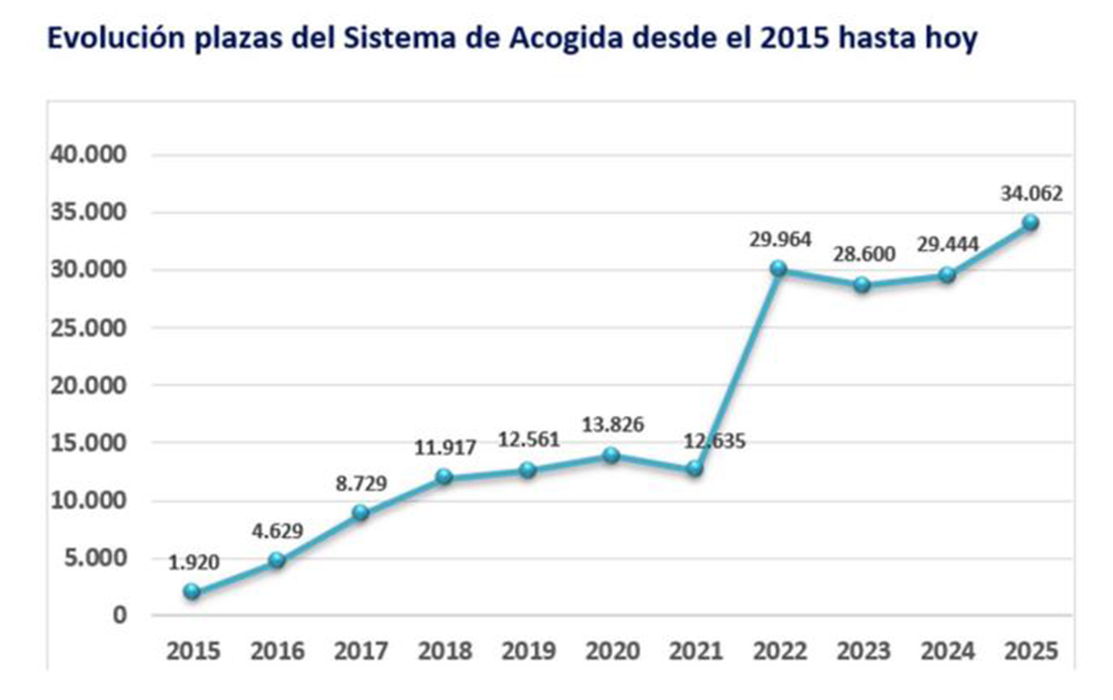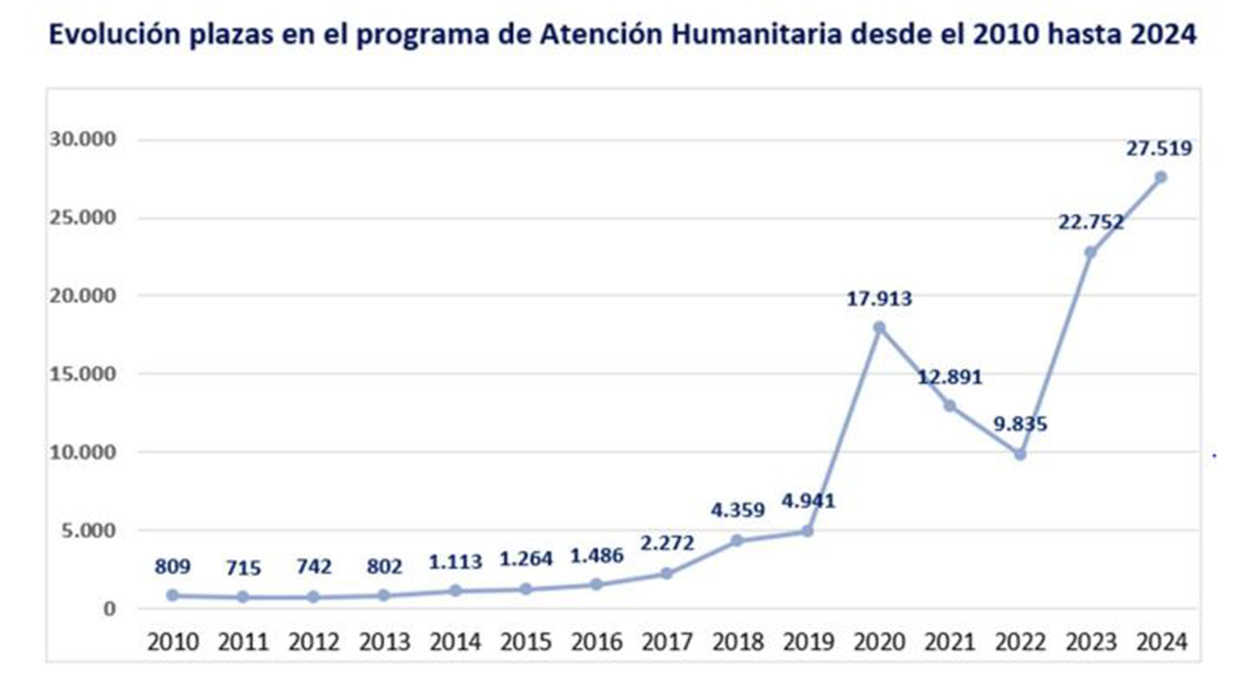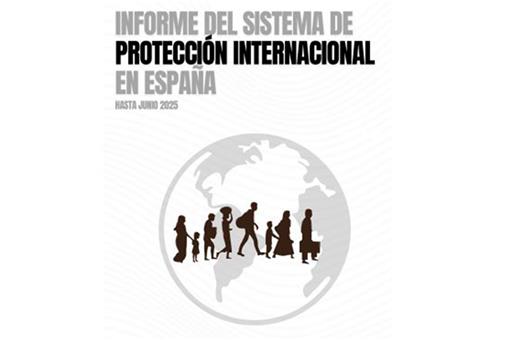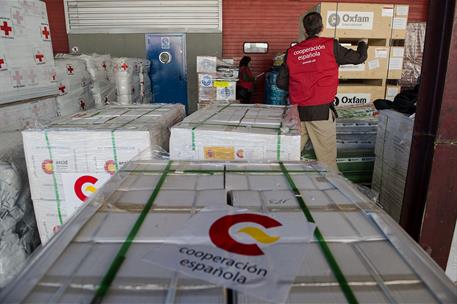World Refugee Day
The Government of Spain has added 32,000 places in 10 years for asylum seekers, an example of international solidarity
News - 2025.6.20
The Government of Spain, through the Ministry of Inclusion, Social Security and Migration, has added around 32,000 places in the International Protection Reception System (SAPI) over the last ten years to cover the needs of asylum seekers. A system that includes from basic care to the final stage of full integration into the host society.
The "Report on the international protection system in Spain", published by the State Secretariat for Migration of the Ministry of Inclusion, Social Security and Migration on the occasion of World Refugee Day, offers an in-depth analysis of the context and data of a system that has strengthened its response capacity after each new humanitarian crisis.
The International Protection Reception System (SAPI) provides coverage of the basic needs of applicants and beneficiaries of international and temporary protection who lack economic resources, accompanying them in their process of acquiring autonomy and integration into Spanish society. SAPI currently serves almost 34,000 people per day, providing them with an individualised integration pathway.
In the last ten years, the system has significantly increased its capacity from 1,920 places in 2015 to 34,062 in June 2025, i.e. there has been an increase of 32,142 new places available, places corresponding to the initial assessment and referral phase, as well as reception places.
Applications for international protection
In terms of irregular arrivals by sea, so far in 2025, up to 15 June, 15,875 people have been recorded, representing a decrease of 31.1% compared to the same period in 2024.
Spain recorded an all-time high of applications for international protection in 2023 with a total of 163,220 applications, an annual increase of 37% compared to 2022. During 2024, the number of asylum applications increased again by 2.5% over the previous year. For 2025, as of June, the Asylum and Refuge Office has registered 64,638 applications, mostly from Venezuelan, Colombian and Peruvian nationals.
At the same time, Spain ranks fourth in the European Union in terms of the number of beneficiaries of temporary protection, with more than 244,069 recognised Ukrainian nationals.
The number of places in the reception system in recent years has therefore been aligned with the growth in applications for international protection, reinforcing its capacity and consolidating the services it offers. Thus, in 2015, the system coped with the Syrian conflict and the massive arrival of refugees in Europe by increasing the number of places by 141% in one year. In 2021, following the exodus of the Afghan population with the coming to power of the Taliban, the reception system made a major humanitarian effort by taking in more than 3,000 people, most of them collaborators from our country in Afghanistan, and in that year the number of places available in the SAPI reached almost 30,000.

From January to June 2025, 49,691 people have been assisted in the reception system for international protection, almost 70% of the total number of people assisted throughout 2024 (65,321).
If we look at the geographical distribution during the first half of 2025, Andalusia is the autonomous community where the SAPI has attended to the largest number of people (11,334), followed by the Community of Madrid (7,613) and Catalonia (6,630). Regarding the data according to the sex of the participants in the programme, between January and June 2025, 31,082 were men and 18,609 women, of which 11,065 were minors. From 2022 to June 2025, the total number of people assisted in the reception system for international protection reaches 24,6553.
Humanitarian Care Programme
On the other hand, the Humanitarian Attention Programme (PAH), which attends to the arrival of people in a situation of vulnerability to Spanish territory through the coasts or crossing the land border of Ceuta and Melilla, has also experienced a constant increase in places over the last fourteen years, and the report reflects an increase of 26,710 places in the period 2010-2024, reaching a total of 27,519 places in December last year.
This programme provides services and aid in the field of emergency socio-health care, reception, supply of materials to cover basic needs, relocation and any other service deemed necessary for groups of migrants who have arrived in an irregular situation and who may or may not subsequently apply for international protection and access, where appropriate, to the SAPI.

Ukrainian citizens
Currently, Spain is the fourth country in the European Union in terms of the number of grants of Temporary Protection to people arriving from Ukraine. As of 14 March 2025, 238,404 people affected by the conflict in Ukraine have received Temporary Protection in Spain (59.41% are women, 40.59% men), almost 70% in the 18-65 age range.
The capacity and resilience of our country's resources has made it possible to deal swiftly with this emergency and also to strategically design both the initial and immediate care and the subsequent inclusion and integration of the displaced into Spanish society. The four Reception, Care and Referral Centres (CREADE) in Madrid, Barcelona, Alicante and Malaga have played an essential role in this itinerary.
From their opening until today, the CREADE have attended to a total of 237,286 people, to which we must add 112,250 people who have been attended to by appointment.
Special complementary programmes
The Ministry of Inclusion, Social Security and Migration also implements special complementary programmes, such as resettlement programmes (approved annually by the Council of Ministers). During 2024, resettlement quotas have not been reduced despite the great migratory pressure on Spain. For the whole of 2025, the same trend is maintained with an agreed quota of 1,200 refugees to be resettled.
On the other hand, the implementation in 2023 of the complementary and additional channel for authorising the arrival of refugees opened up the possibility of implementing additional quotas to those of resettlement programmes and a new commitment to mechanisms for orderly and safe mobility, protection of refugees and international solidarity.
Along the same lines is community sponsorship, where the reception and integration of refugees is undertaken jointly by public administrations and private actors. Since 2019, the Secretary of State for Migration has signed agreements with different Autonomous Communities (Basque Country, Valencian Community and Navarre), sponsoring entities and the United Nations High Commissioner for Refugees (UNHCR) to implement pilot community sponsorship programmes in Spain.
Non official translation






